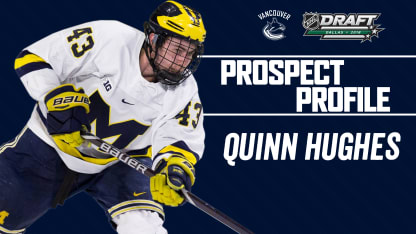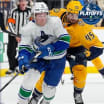Prospect Profile: Quinn Hughes
...speed and skill is the name of the game in the NHL and defenceman Quinn Hughes has them both

There is little doubt about the skill level that the American born defenceman possesses, but there have been questions about how effective he can be simply because he is 5-foot-10, 174-pound frame. Those worries are overstated as Hughes has shown despite being on the smaller side, he can use his elite skating and offensive abilities to impact the game in an immensely positive way.
Season Stats
| GP | G | A | P |
| --- | --- | --- | --- |
| 37 | 5 | 24 | 29 |
The Orlando, Florida born defenceman started his junior career in Ontario before committing to the University of Michigan in January of 2015 as a 15-year-old. Despite being drafted by the Sarnia Sting in the OHL draft a few months after committing to the NCAA, Hughes headed to the United States National Development Team Program (USNDTP) for the 2015-16 season and worked his way through their U17 and U18 programs.
He represented the United States at the U17 World Juniors in 2015-16 where he had one goal and five assists in five games. He once again donned his country's colours at U18 World Juniors to close out the 2016-17 season with one goal and four assists in seven games.
The USNDTP play games against USHL teams throughout the season and its worth noting that during the 2015-16 season, Hughes posted 26 points (4-22-26) in 26 games against that USHL competition, which was the highest point-per-game pace in the USHL by any defenceman that was two years out from draft eligibility.
Some of the names on the list that Hughes outscored include Charlie McAvoy, Zach Werenski, Seth Jones, and Noah Hanifin. Not to compare him to those players, but that is some really impressive company to lead.
Two and half years later, Hughes made the leap to the NCAA this season and made his mark immediately with 29 points (5-24-29) in 37 games. That was good for the third most points by a rookie defenceman in Collegiate hockey. Hughes played at least four fewer games than the two players above him as he was suiting up for the USA for the U20 World Juniors in Buffalo. He was dynamic in the NCAA playoffs leading Michigan to a Frozen Four appearance.
To close out his draft season, he was named to the World Championships roster for the United States and held his own playing against professionals for the first time in his career. He made an impact in that tournament with three assists in seven games, which helped calm some of the questions about his size being an issue going forward.
No matter how you look at it, those concerns were likely overstated as many realize that although size is important, you just can't teach the skill that the left-handed defender possesses.
Watch: Youtube Video
Hughes is a gifted skater who can use his edges to adjust his lanes with ease while maintaining full speed and control of the puck. He has quick acceleration that allows him to stop on a dime and then get back up to speed in the blink of an eye. Opponents will try to contain him and take advantage of the size disparity, but Hughes just leaves them in the dust and usually with the puck on his stick.
He uses that elite skating to carry the puck out of his own zone and into the opponent's zone. It's fair to say that Hughes can be a one-man breakout and transition machine, carrying the puck out of danger and then turns it into an attacking situation. The Michigan Wolverine is smart in the offensive zone, making high percentage plays to his teammates and if that isn't available, he will retain it until such a situation arises.
Hughes can quarterback a power play with skill, combining his skating, puck distribution, and surprisingly heavy shot to create chances in a multitude of ways. If an opponent tries to cheat and cover his space when set-up, he will dart into another area to open himself up or will make a perfect pass to the player that was left open.
In respect to his defensive game, Hughes is smart in his engagements and uses his active feet and stick to smartly challenge his opponent. It's a quick stick lift or poke of the puck rather than trying to push the opponent off the puck. Once the puck is retrieved, he is gone to the races. Hughes is such a self aware player, who understands his own disadvantages and doesn't put himself in situations where his size is an issue. He showcases his talents to be effective in all three zones.
There will always be questions about player's size and if they can be effective in the NHL. In order to overcome those size concerns, the player needs to have the skills, smarts, and work ethic to make his mark. Hughes has all three of those and so much more.
He is expected to return to the University of Michigan for at least one more season to round out his game further and work on adding strength.
Any team looking for a power play quarterback who pushes the pace with the puck on his stick should look no further than Quinn Hughes. He may be smaller than some of his peers but his talent is so much bigger.


















